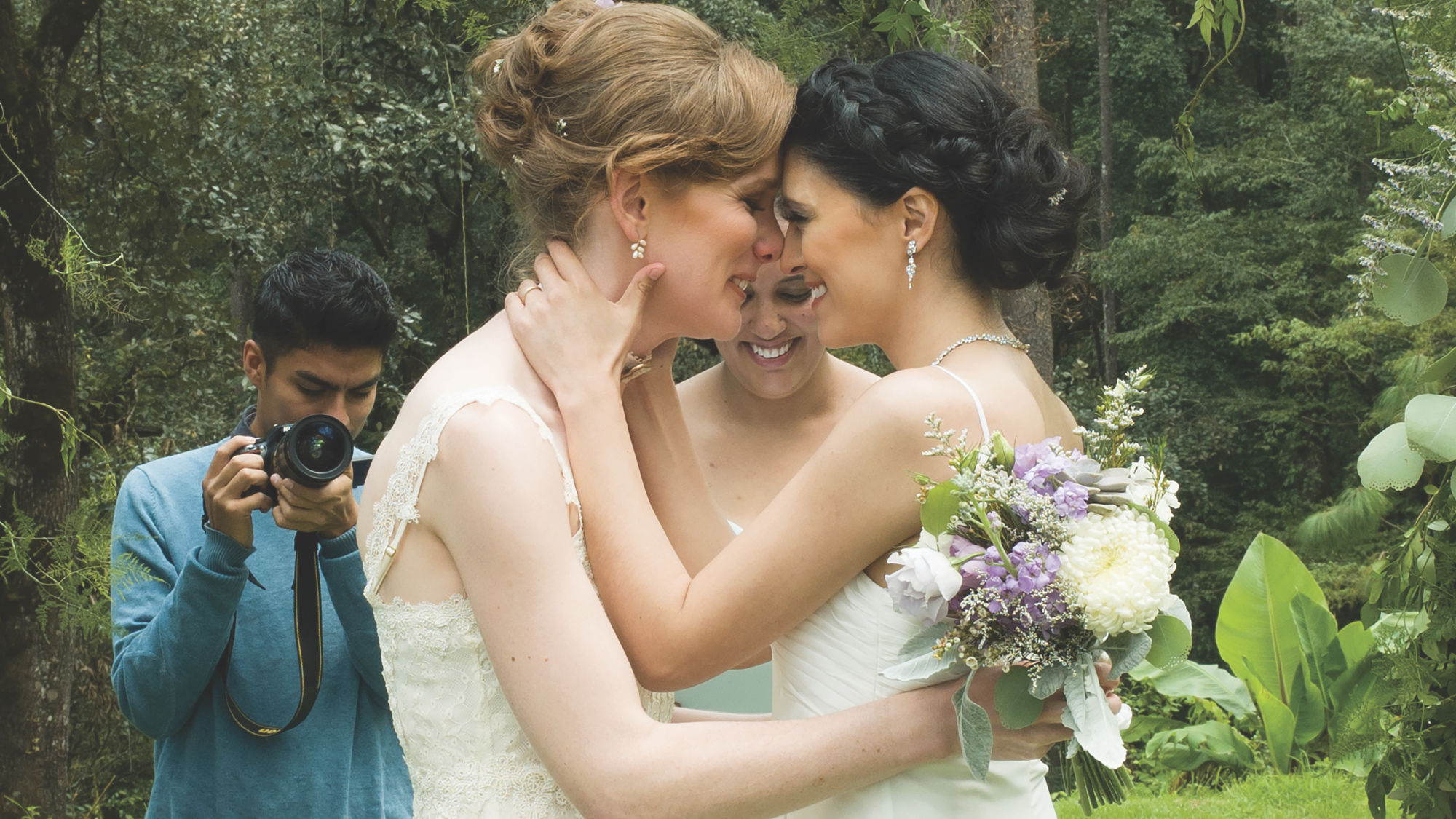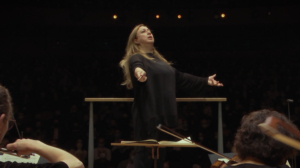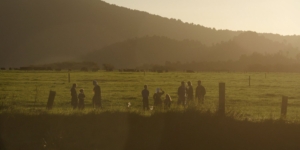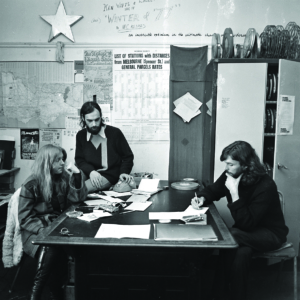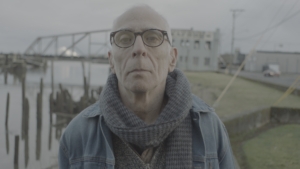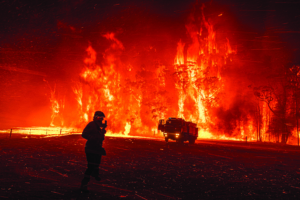Em Baker is no romantic, and far from the kind of woman who spent her youth waiting for Prince Charming to sweep her off her feet. Marriage, to her, is ‘a stodgy, patriarchal, antiquated institution’, and not one that she, as a queer woman, ever felt particularly drawn to or welcome within. She’s an unlikely candidate, then, to spend four years and a considerable amount of her own savings on travelling around the world to immortalise the wedding days of four women. Yet that’s exactly the journey we sit down to speak about following the world premiere of her debut feature documentary, I Am No Bird, at the 2019 Sydney Film Festival (SFF).
So how does a self-described cynical feminist end up making a film about marriage? Baker’s career in filmmaking began when, as a 21-year-old journalism student, she became enamoured of a short film called Glory at Sea (2008). After contacting the film’s director, Benh Zeitlin, and producers, she was invited to move to Louisiana and be trained as a visual-effects artist on Zeitlin’s next project, the eventual multi-Oscar-nominated, Cannes Caméra d’Or–winning Beasts of the Southern Wild (2012). Following that ‘extremely fortunate’ experience, Baker became determined to make her own film. She decided to bicycle across the United States, from San Francisco to Orlando, and film what she could along the way – an idea that eventually became Spoke (2015), an hour-long documentary exploring why the US is among the most dangerous developed countries for cyclists.
Upon her return to Australia, Baker began working as a schoolteacher as well as doing visual effects on a number of blockbusters. She was on the lookout for her next film’s subject when, through a friend, she heard about a young woman, Anna, who was preparing for her wedding. What caught Baker’s attention was that Anna and her fiancé were both ‘saving themselves’ for marriage due to their religion, a highly unusual choice in Australia today. And so she found her next project: ‘I decided to make this film with a similar kind of attitude to the first, I guess: I have no money, but no-one can stop me,’ Baker recalls.
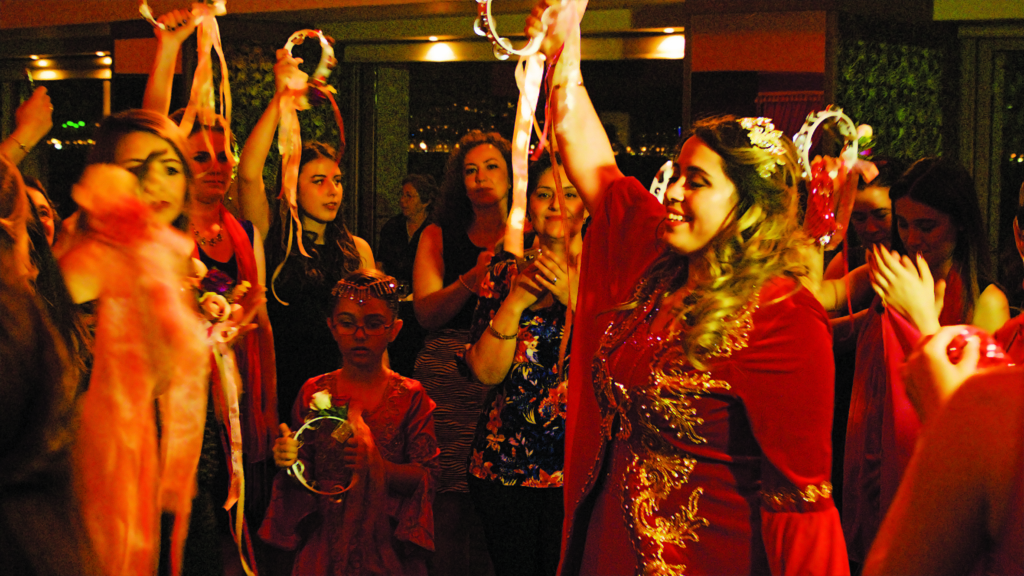
The filmmaker set about finding other women preparing for their weddings. Through friends of friends, social media and other filmmakers, she eventually found her remaining three subjects in India, Turkey and Mexico: Luthanlu, Benay and Dalia, respectively. It was important to Baker that she portray a range of experiences, traditions and motivations through her brides, but filming across such diverse locations proved challenging, especially as Baker was self-funding the project while continuing to work full-time as a teacher. In the end, filming and producing her project around her day job took Baker four years and a significant investment of her own money.
While she was able to recoup some of these funds via Screen Australia’s Producer Equity program[1]See ‘Producer Equity Program’, Screen Australia, <https://www.screenaustralia.gov.au/funding-and-support/documentary/production/producer-equity-program>, accessed 2 August 2019. (‘Thank you, Screen Australia – I am your biggest fan!’ she says), Baker is highly aware of the barriers faced by young filmmakers like her when trying to get projects underway. With grassroots funding sparse on the ground, breaking into the industry can be hard, if not impossible, for many. ‘There’s just so much unpaid work required of young filmmakers, and paying out of pocket to hire equipment,’ she says.
There’s no easy fix for the meagre funding and development support that has become the norm, but Baker believes boosting investment in short-film production would be immensely valuable to the industry, as it would allow fresh talent to sink their teeth into a project and potentially make a name for themselves at relatively low cost. Baker may be on to something with this recommendation: Adelaide-based producer Julie Ryan, for instance, has recommended that aspiring screen content producers eager for feature-film funding first consider making a short film in their chosen genre.[2]See Malcolm Sutton, ‘Getting Finance for Your Feature Film Will Be Key Topic at Screen Makers Conference’, ABC News, 19 July 2019, <https://www.abc.net.au/news/2019-07-19/good-short-film-is-the-secret-to-feature-movie-success/11321164>, accessed 2 August 2019. For Baker, addressing this lack of access to the film industry is critical to ensuring a more diverse set of voices can be heard:
We miss out on huge swathes of the community being able to tell their stories – stories that could change our country and change our perspectives – because they don’t have the money to tell us.
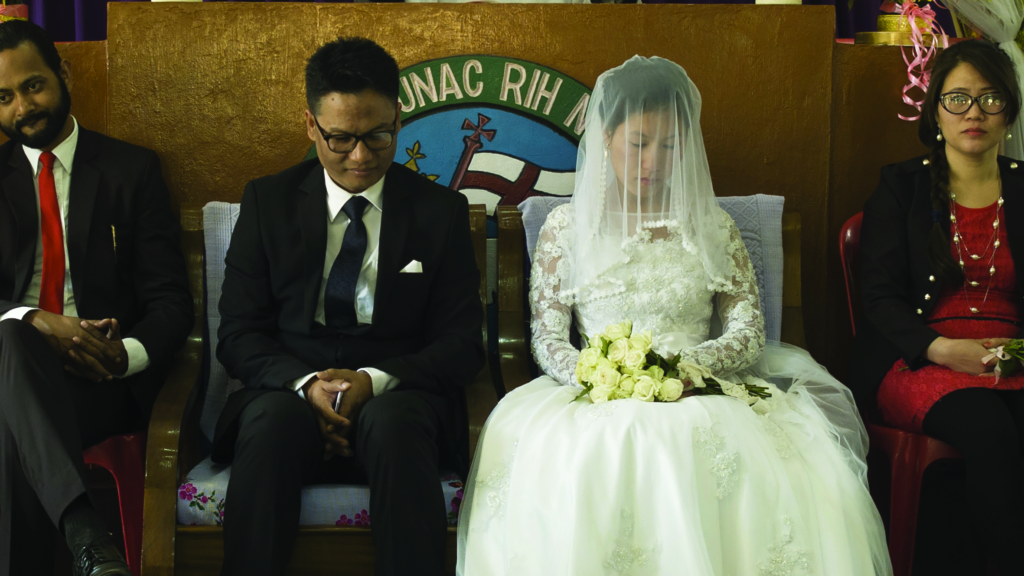
Funding short films would also help up-and-coming filmmakers who can’t afford film school or who, like Baker, want to gain on-the-job experience. As she found, each new project brings with it the chance to make connections with other screen professionals with differing levels of experience, along with a host of learning opportunities.
But Baker’s learning was not just confined to filmmaking; she also immersed herself in a world she had always felt distant from. ‘I didn’t really see the point [of marriage],’ she says, ‘but my views changed as I filmed this project.’ One of the key things Baker was keen to explore in her film was the relentless and often-contradictory ideas that women across the world receive about weddings from a very young age, and how it shapes their perceptions as they grow up.
You get messaging that ranges from, ‘It’s your day and you’re a princess and it’s the happiest day of your life,’ to [marriage] being a form of servitude, and that women die younger if they are married.[3]See Sian Cain, ‘Women Are Happier Without Children or a Spouse, Says Happiness Expert’, The Guardian, 25 May 2019, <https://www.theguardian.com/lifeandstyle/2019/may/25/women-happier-without-children-or-a-spouse-happiness-expert>, accessed 2 August 2019. And there is a lot in between.
To represent some of these messages, and to give the film structure, Baker has utilised intertitles featuring quotes about marriage from a wide range of sources, including the Charlotte Brontë passage that gives the film its title.[4]‘I am no bird; and no net ensnares me; I am a free human being with an independent will’. Charlotte Brontë, Jane Eyre, Signet Classics,New York, 2008 [1847], pp. 257–8. She further uses a mixture of animation and super 8 footage to portray, in turn, the formative experiences the women had in their childhoods that shaped their motivations as adults, as well as to create a space for her characters to reflect on anything from marriage and culture, to religion and love.
Filming across such diverse locations proved challenging, especially as Baker was self-funding the project while continuing to work full-time … Baker is highly aware of the barriers faced by young filmmakers like her when trying to get projects underway.
While well executed individually, the inclusion of both animation and super 8 footage does not entirely work, and their intended purpose was unclear until Baker gave context for them post-screening. This is partially because the techniques aren’t applied consistently: while the animation seeks to cast each character as a sort of Disney Princess and to represent their childhood experiences, it does so for only three of the women. Anna’s animation sequence shows her as an adult, visiting a lingerie store to purchase her wedding undergarments and having an uncomfortable conversation about her virginity with the shop attendant.
Similarly, the super 8 footage, while beautiful and certainly evoking the ‘dreamlike, otherworldly and timeless’ effect Baker was after, also proves somewhat disorienting. As the film opens with a super 8 sequence featuring Benay in Turkey, it is not immediately clear where or when the footage is set. Its vintage appearance at first suggests it may be footage from Benay’s childhood, or else stock footage. This ambiguity at the start of the film carries into subsequent super 8 sequences, until the viewer becomes familiar enough with the four women to recognise their faces and realise that they are set in the present. Even once that initial confusion has been settled, each instance of super 8 may appear arbitrary alongside the digital footage and animation, as the differences between normal conversation, childhood recollection and deeper thematic reflection are too subtle to connect to the three visual styles. Together, the intertitles, animation and super 8 footage combine to give the impression of a young filmmaker eager to experiment with the myriad techniques at their disposal, rather than choosing only those that the story calls for.
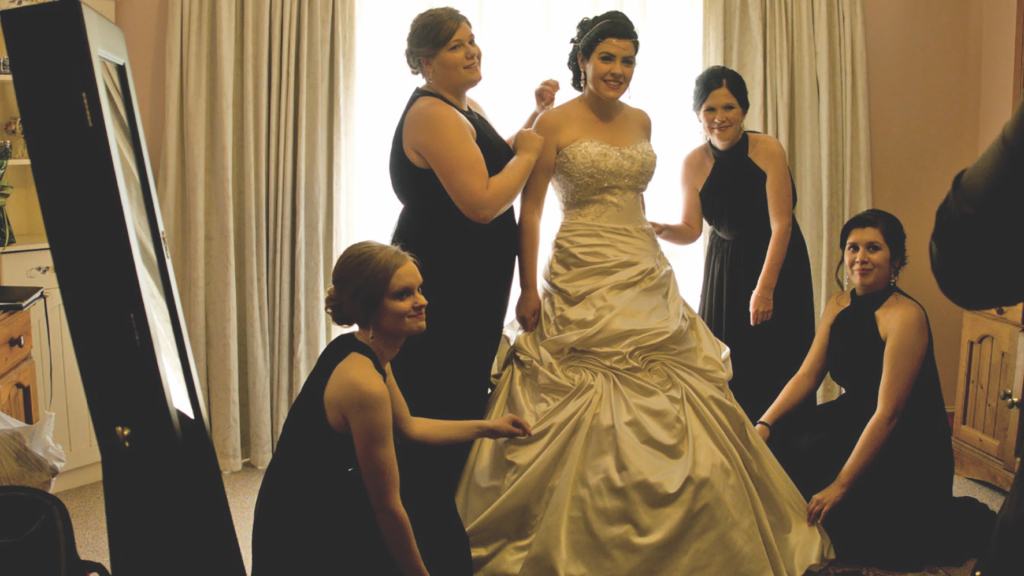
In saying that, this somewhat-clunky application of style by no means takes away from the enjoyment of the subject matter, and seems to merely reflect the still-developing technical prowess of a deeply original and courageous voice in Australian documentary. I Am No Bird is an intimate and moving portrait of the significance women around the world place on marriage, which makes it a timely and important cultural text as the definition and significance of this institution around the world continues to be debated and challenged.
As the film recounts, Anna, Benay, Luthanlu and Dalia approach marriage in different ways, and for different reasons. To Anna, it is a deeply religious ceremony, and one she must partake in before sharing her soul and body with her partner. While Benay also visits her local mosque as part of her lavish multi-day wedding celebrations, it is hardly her driving motivation. Rather, she is eager to move in with her partner of five years and start a family, something that is not an option for unmarried couples in her Turkish community. Further, Benay has chosen to schedule her wedding for Mother’s Day, in remembrance of her late mother and to give the day a happy association once more. For Luthanlu, marriage is an important part of sustaining her Rongmei Naga heritage, as the ethnic group is a minority in India. She has chosen her husband from her local village, as they speak the same language, eat the same food and can uphold traditions that might otherwise be at risk of dying out. And Dalia is hopeful that her mother’s agreement to attend her wedding means they may finally heal old wounds, and that her mother may accept her and her sexual orientation.
I Am No Bird is an intimate and moving portrait of the significance women around the world place on marriage, which makes it a timely and important cultural text as the definition and significance of this institution around the world continues to be debated and challenged.
Baker was keen to explore these varied motivations in part because she herself felt ambivalent about matrimony’s continuing relevance. But, as the project progressed, she began to appreciate marriage for the array of personal meanings people gave it.
I think there is something really incredible and beautiful about a tradition of marriage where we say, ‘Take everything that is important to you. Take your culture, take your faith, take your family, and take the people that you love. Or take your atheism and your two best friends. Take whatever it is that is important to you and make something that holds significance to you.’
Perhaps ironically, in the midst of working on her film, Baker decided to get married. As she learned more about the motivations of the other brides, she started to find the meanings marriage could hold for her, too.
I wanted to embrace my partner’s culture. I wanted to participate in a ceremony that my mother had participated in. To kind of carry on my own family’s culture and traditions. I wanted to stand in front of the people we loved and make a commitment to love this person essentially until we die.
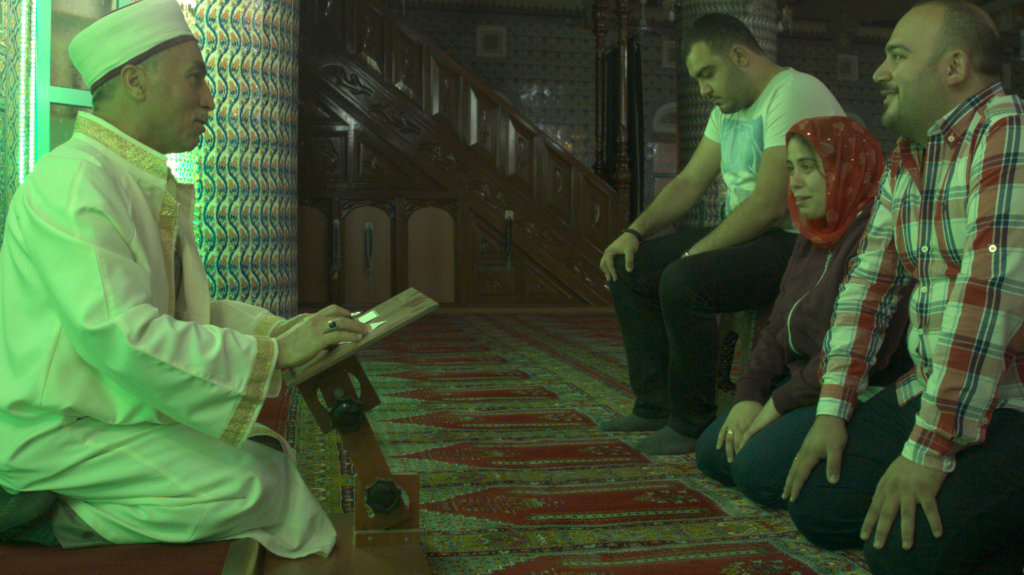
Now in the shoes of the women she had spent years documenting, Baker started to feel the same demands most brides around the world endure in the lead-up to their weddings. She jokes that it was perhaps a kind of karma that, after years of asking others to share these deeply intimate and vulnerable moments – wherein anything from family relationships, faith and financial capacity to even bodies become exposed and open to public scrutiny and commentary – it was finally happening to her.
I felt it all acutely. I certainly felt a lot of pressure around the way I look. That is probably what I resented the most about the process. There seemed to be a large focus on how I would look, what I would wear and, like many of the brides in this film, what I would weigh. I truly detested that. [But] I felt, on the day, none of that was at all relevant.
On top of the usual stress that a bride typically bears as her big day approaches, Baker was in the midst of editing her film. At the same time, another momentous process surrounding marriage was unfolding around her, which had profound effects on her personally as well as on her documentary:
It shouldn’t be underestimated how much of an impact the same-sex marriage plebiscite had on the way this film was edited. That plebiscite was happening literally all around me while we were in post-production on this film. At one point, my office became the headquarters of the ‘Yes’ campaign. It’s hard to articulate the disappointment I felt during that time.
Even though she was about to get married to a man, Baker – who identifies as bisexual – felt that the legalisation of same-sex marriage was absolutely essential to her sense of belonging within the institution. While the plebiscite eventually achieved this outcome, the way the ‘No’ campaign unfolded and the lack of consideration for the rifts the vote would inevitably cause left Baker feeling betrayed and let down by the Australian Government.
Our elected officials had taken the cowardly choice to pit one half of our community against another half […] In the wake of the plebiscite, there [were] thousands of people across the country whose relationships with their families or their friends were ruptured irreparably.
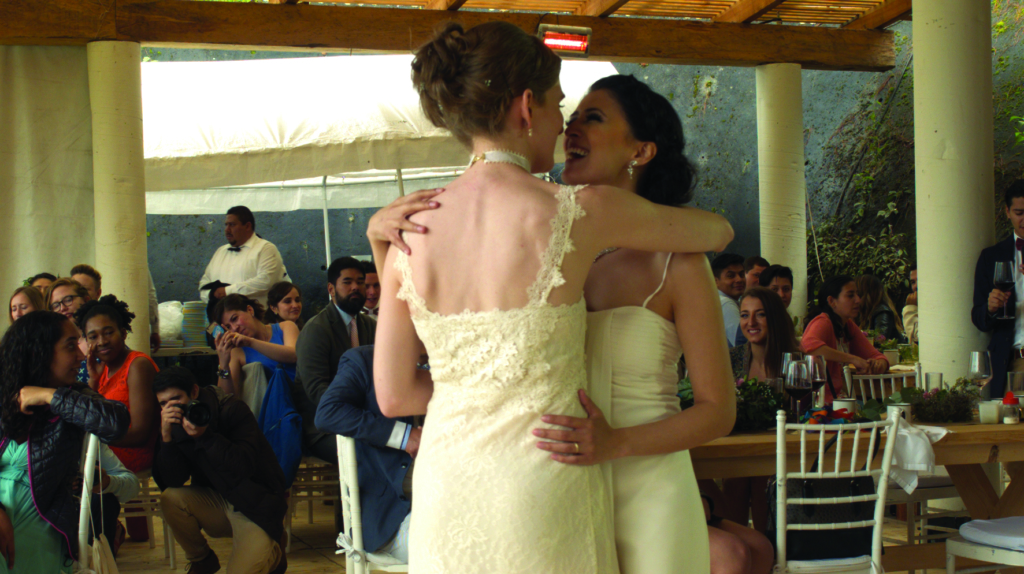
To Baker, I Am No Bird is an exploration of the meaning of marriage for different women, as well as an antidote to the exclusionary politics and restrictive notions that continue to define it for many. Thus far, the film appears to have resonated well with audiences: it premiered to a full house and a glowing reception at SFF, where it competed for the Documentary Australia Foundation Award, and has been slated for theatrical release this year.
It has also served to open new doors for Baker, who continues to jump into new projects with an enviable verve and confidence. Barely a week following the premiere of her first feature, the filmmaker was already preparing to return to India to film her next one, tentatively titled ‘The Vinyl Records: Destroy Phallus Oppression’, about an all-female punk band in New Delhi. She’s in the middle of post-production for a short film she wrote and directed – Dolphin, which is due for release later in 2019 – that explores the experience of being a bisexual woman. She’s writing her first TV pilot, as part of Cinespace’s Diversity Writers’ Room, and there may also be the beginnings of a feature-film script in the works.
Obviously, marriage has hardly slowed her down, and her husband is, as can be expected, fully supportive of her ambitions. So, at the end of the day, where does she now stand on this ‘stodgy, patriarchal, antiquated institution’?
What I have taken from this experience is that marriage, like every institution in this world, is deeply flawed. And, like every other institution in this world that I engage with, it is one [in which] I am seeking to find what works for me and take what I can from it. With that all said, I don’t think I have ever felt anything as powerful as the moment I said my vows with my husband. That was a really almost overwhelming experience – something that I will treasure for the rest of my life.
Endnotes
| 1 | See ‘Producer Equity Program’, Screen Australia, <https://www.screenaustralia.gov.au/funding-and-support/documentary/production/producer-equity-program>, accessed 2 August 2019. |
|---|---|
| 2 | See Malcolm Sutton, ‘Getting Finance for Your Feature Film Will Be Key Topic at Screen Makers Conference’, ABC News, 19 July 2019, <https://www.abc.net.au/news/2019-07-19/good-short-film-is-the-secret-to-feature-movie-success/11321164>, accessed 2 August 2019. |
| 3 | See Sian Cain, ‘Women Are Happier Without Children or a Spouse, Says Happiness Expert’, The Guardian, 25 May 2019, <https://www.theguardian.com/lifeandstyle/2019/may/25/women-happier-without-children-or-a-spouse-happiness-expert>, accessed 2 August 2019. |
| 4 | ‘I am no bird; and no net ensnares me; I am a free human being with an independent will’. Charlotte Brontë, Jane Eyre, Signet Classics,New York, 2008 [1847], pp. 257–8. |
